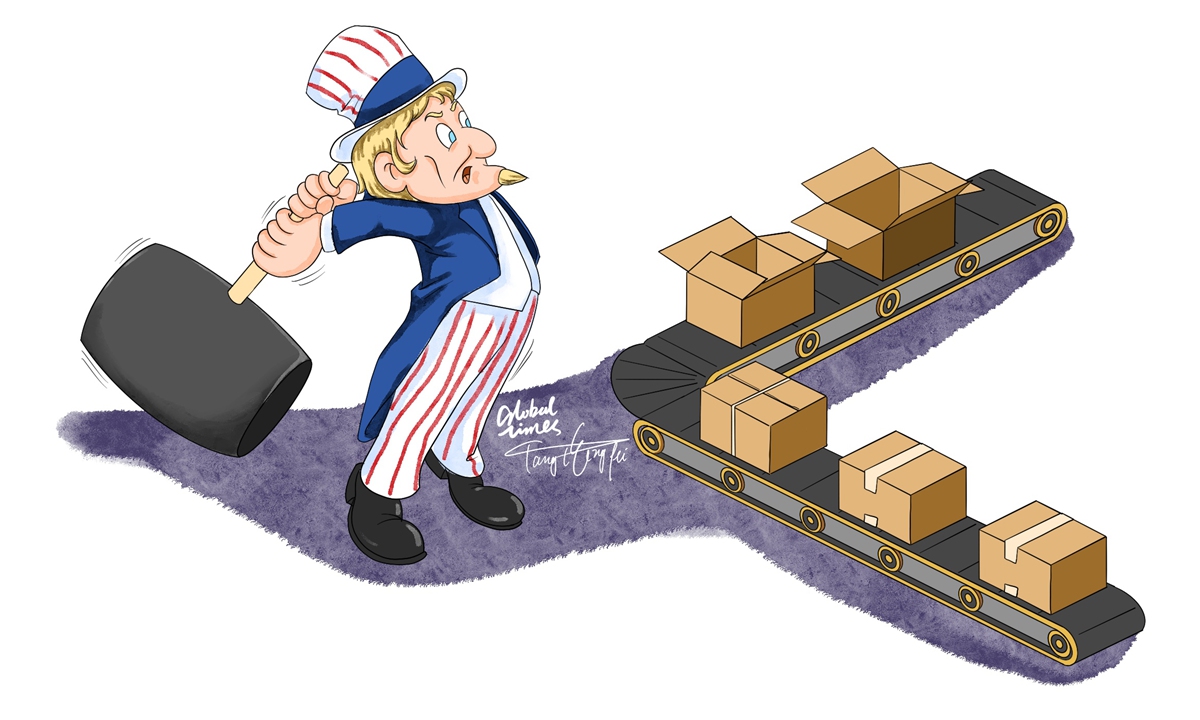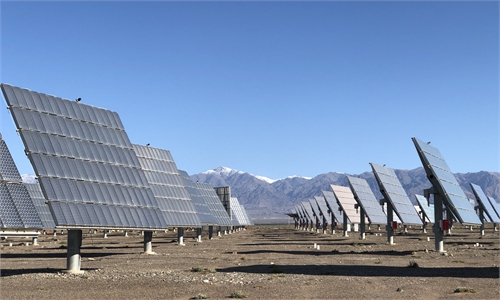COMMENTS / EXPERT ASSESSMENT
US’ scheme to exclude China from global industrial chain doomed to fail

Illustration: Tang Tengfei/GT
As the US and its allies' smear campaign against Xinjiang cotton is already on life support, Washington has shifted to attacking another booming industry in Northwest China's Xinjiang Uygur Autonomous Region.
The Biden administration on Wednesday reportedly ordered a ban on US imports of a key solar panel material manufactured by Hoshine Silicon Industry. It also added a further five companies that make polysilicon - a raw material used by the solar industry - to its so-called "entity list," which requires US companies to secure a license from the government before doing business with them, the Financial Times reported.
From cotton to solar products, the US viciously uses a fabricated human rights issue in Xinjiang to intensify its attack on China. This is nothing but a gross interference in China's internal affairs in an attempt to contain China's development and hinder China's rise.
Instead of caring livelihood of the people in Xinjiang, the US' real agenda is to exclude China from the international industrial chain. By using the so-called human rights issue, the US government is attempting to coerce its allies to squeeze China out of the global industrial chain and supply chain of critical industries, in a bid to ensure the US-led small clique's dominating position in global production and consumption.
When the US and its allies chose to play the Xinjiang cotton card in March, it is not hard for China to figure out they would sooner or later target at other industries. As might be expected, the US has started the same set of routine to attack the solar industry in Xinjiang. Aside from the solar industry, it is believed that the US might put other Chinese high-tech companies that have earned a competitive advantage against US companies on their blacklist in the future. At the same time, the US will also ramp up efforts to push its allies to jointly restrict Chinese companies.
However, as it has been proved by the US' smearing and attack against Xinjiang cotton, the current and following moves in attempt to shake China's position in global industrial chain and to hinder China's growth are all bound to fail.
First, the US' arbitrary moves are based on complete lies. By making baseless allegations such as the so-called genocide and forced labor issue in Xinjiang, the US simply tries to stigmatize China in international public opinion. However, as China's Foreign Ministry spokesperson said on Thursday, it is the US itself that have committed genocide and forced labor. In an era of global interconnectivity and open sources, how long does the US really think it can fool its allies with these botched lies?
Second, will other Western countries really choose to follow the US' coercion to crack down on the solar industry in Xinjiang even know the campaign is based on lies? It may still need to be observed. European countries are not as paranoid as the US in terms of ideology, and they do not have such a radical cold war mentality as the US, so it is believed that most Western countries will not follow the US' lead, but it does not rule out the possibility that some countries will succumb to the US.
Third, China's industrial development is based both on independent technology progress and international cooperation. China's industry has been well-integrated into systems of international cooperation, and the domestic market prospects are broad. If the US wants to make up lies to exclude China from the international industrial chain, it will in turn hinder its own industries development.
In response to the US' ban against solar products in Xinjiang, a spokesperson from China's Commerce Ministry said on Thursday that China will take the necessary measures to resolutely safeguard the legitimate rights and interests of Chinese enterprises and institutions, and the US should immediately correct the wrong actions of carrying out protectionism and bullying with its national power.
The author is professor at the Institute of International Relations of the China Foreign Affairs University. bizopinion@globaltimes.com.cn



